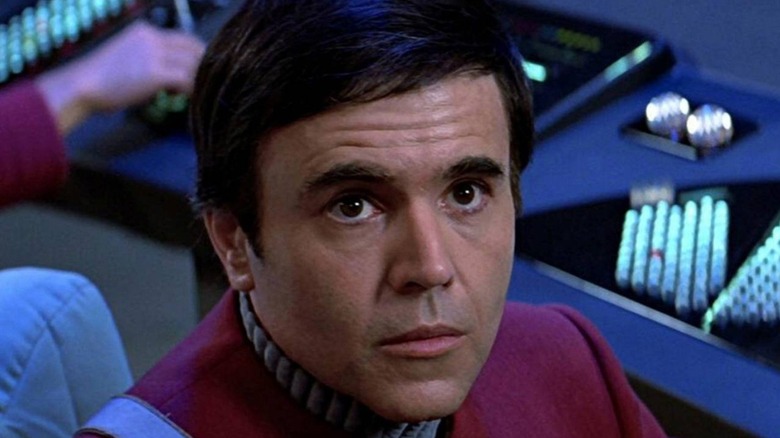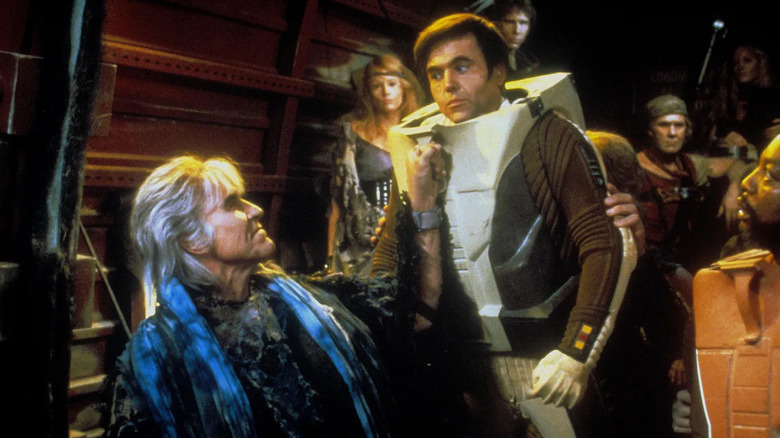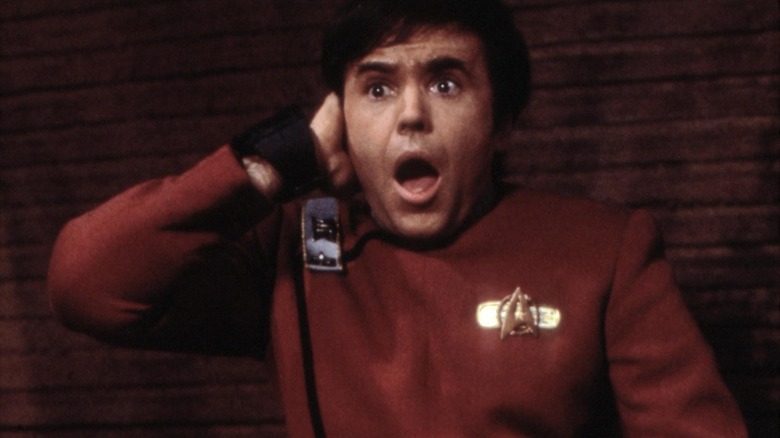One Interaction With William Shatner On Star Trek Left Walter Koenig In Severe Pain
Walter Koenig joined the cast of "Star Trek" in 1967 as Ensign Pavel Chekov, the feisty Russian upstart who was always quick to point out that a lot of human culture originated in his home country. He was often hot-headed and a little brash, but always capable.
By the events of the 1982 film "Star Trek II: The Wrath of Khan," Chekov had been promoted to the rank of commander and served as the executive officer on board the U.S.S. Reliant underneath Captain Clark Terrell (Paul Winfield). In that film, Commander Chekov and Captain Terrell were captured by the revenge-bent Khan (Ricardo Montalbán), who forced miniature Ceti eels into their ears. The eels burrow into their hosts' brains and make them docile and suggestable, forcing Chekov to turn against Starfleet and aiding Khan in his evil schemes. By halfway through the film, Chekov is reunited with his old captain, James T. Kirk (William Shatner). Luckily, Chekov manages to reject the eel and rejoins Kirk on board the U.S.S. Enterprise.
It's worth pausing to note that Shatner was notoriously difficult to work with; he would often hog the spotlight on "Star Trek," treating his co-stars like tertiary players to his own fame and ego. "Star Trek" creator Gene Roddenberry even once wrote an angry letter to Shatner and to Spock actor Leonard Nimoy over their childish need to focus Trek scenes on themselves.
By 1982, Koenig finally had the casual temerity to jibe Shatner on his old spotlight-hogging habits. However, when Koenig joked to Shatner about it on the set of "Wrath of Khan," he received an icy stare that left the actor feeling physically ill for a day. Koenig talked about the experience in a recent interview with TrekMovie.
The bad moment
It seems that Koenig, for the most part, had a very positive experience working on "Star Trek." He appeared in the show's first and second seasons, as well as all six feature films based on the original series. He recently had a voice cameo in the final episode of "Star Trek: Picard," playing a descendant of Pavel Chekov. It seems, however, that he had his worst experience while filming "Star Trek II," thanks to the above-mentioned incident.
"I had one bad moment. And it wasn't the TV show, it was one of the movies with Bill, in the second movie. That was the only really bad moment that I've had in the whole history of watching 'Star Trek' or being involved in 'Star Trek.' We were getting ready. You know, they discovered me and Paul and then we got on the transporter. And I was standing behind Bill on the transporter, we were all going to beam out. And Bill looked at me and said, 'Move a little bit this way.' He didn't want me so much in the shot. So I said, 'I'm just doing what you would do, Bill.'"
Koenig was playfully mocking the well-understood fact that Shatner would try to put himself in the middle of the screen at all times, often stepping out from behind co-stars to make himself more visible. Koenig seemingly wasn't trying to get himself on camera for the scene in question, but bringing up Shatner's habit caused the man to become enraged. Shatner's co-stars have been saying for years that the actor was a prima donna and that no one got along with him. Koenig's jibe was, it seems, an example as to why.
The Wrath of Shatner
Koenig recalls Shatner's overblown reaction to his joke about the actor's tendency to step into the spotlight. It seemed far larger than the joke being made. Koenig recalls:
"[Shatner] said, 'That's neurotic! That's neurotic!' And then he did a double take to look at me twice — as if looking at me twice is going to somehow cow me. So I went home and I had a severe gut pain for the rest of the evening. But I got over it."
Luckily Koenig was not cowed by the icy stare. Indeed, having come in for the second season of "Star Trek," he seemed to possess a pretty healthy and egalitarian attitude toward working with an ego like Shatner's. He understood that he wasn't the star of "Star Trek," and that Shatner, Nimoy, and DeForest Kelley were the top-billed actors. Koenig was fine playing a supporting role. He said this was true of most TV in the 1960s:
"You know, Shatner's attitude was reminiscent of the attitude of the times. When we did 'Star Trek,' it wasn't a c-a-s-t, it was a c-a-s-t-e. We were distinguished by our position. If you were one of the three stars — and this was not 'Star Trek' alone, this was most television series — you got billing at the top of the show, which may seem inconsequential, what does that really matter? But it reflects an attitude [...] Did that bother me a lot? No. It was the way things were, that was the sign of the times."
William Shatner, Koenig said, wasn't behaving any differently than any other TV lead. It wouldn't be until 1970s reappraisals that Trek would emerge as an ensemble drama, not as a TV series with three leads. Koenig was okay with that.


